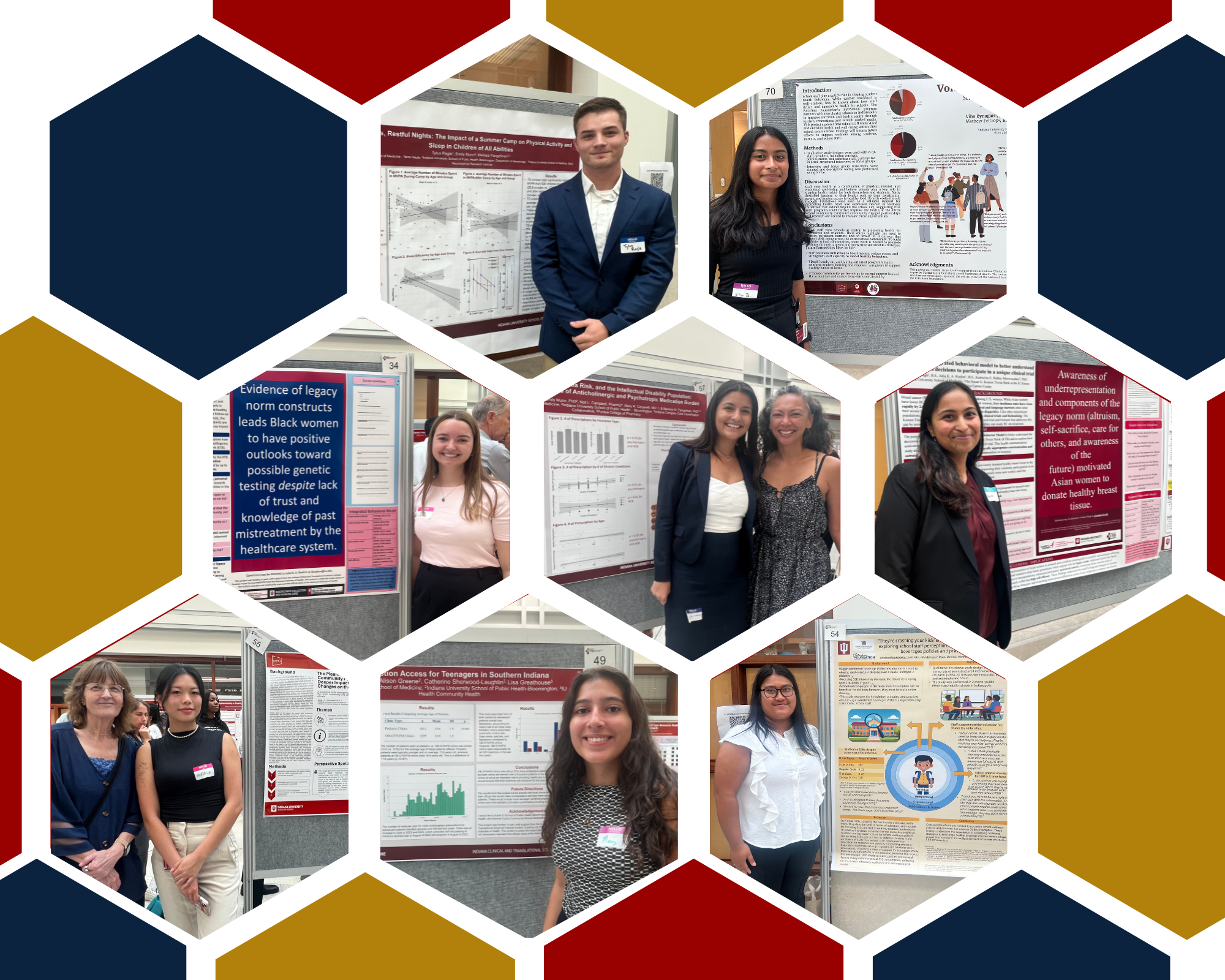Medical students find purpose and perspective through Community Health Partnerships internship

This summer, a group of medical students stepped beyond the lab and into Indiana communities through the Indiana University Medical Student Program for Research and Scholarship (IMPRS). They did this with Community Health Partnerships, the community engagement arm of the Indiana Clinical and Translational Sciences Institute (CTSI).
Designed for students interested in research that centers people and communities, the program offers experience in community-engaged research. Students take a collaborative approach that prioritizes the needs and voices of the community in addressing health challenges.
The students’ summer research projects addressed real-world issues as childhood nutrition, adolescent mental health and resilience, clinical care for individuals with intellectual and developmental disabilities, and the participation of community members in cancer research.
Learning through partnership and practice
Throughout the internship, students applied a variety of tools and methods to do their work. They conducted and analyzed qualitative interviews, designed surveys, and helped implement or evaluate health programs. These experiences gave them deeper appreciation for the complexity and importance of community-based research and the partnerships at its heart.
“As a medical student interested in public health, I really valued the opportunity to learn how community-engaged partnerships can build trust and promote meaningful, lasting change,” Viha Byynagari reflected. “After years of bench research and pipetting, I’m grateful for the chance to explore a different side of research—one that centers people, relationships, and tangible impact.”
Mary Skelly appreciated the opportunity to work on issues that mattered in her own community. “I made infographics for school nurse trainings and helped improve their sexual education curriculum and my mentors told me how much the schools appreciated my work. I felt very involved with my local schools, and my work had a direct impact on this community, which was really inspiring.”
Inspiration from community leaders
In addition to their project work with mentors, the students also attended weekly seminars to gain a broader understanding of the principles of community-engaged research, and to learn about a variety of community-engaged projects and programs. Weekly seminars featured speakers, both researchers and community partners, who are improving the health of communities through research and evaluation projects. Students found these sessions both educational and inspiring.
Arnima Singh loved hearing how the speakers were actively making a difference in their communities: “Learning about what they do was so insightful, and I hope to incorporate what I learned in my training/work going forward!”
Tytus Ragle added, “The weekly seminars provided examples of people ad organizations who are transforming communities through community engaged research. It was inspiring to hear about the influence that just a few passionate people can have on a community.”
A broader vision for medicine
For many students, the internship changed their understanding of what it means to be a physician and a researcher. “I feel like I gained an insight that I truly believe every medical student should experience—it will make us better physicians, better friends, better siblings and students, and better people,” Priya Kirtley said. “I came away with a deeper understanding of the world around me and my path in it, with service and community being at the heart of both.”
Jondea Mon-Romero emphasized the importance of tailoring interventions to the communities they serve. “Interventions matter most when they’re tailored to the people we serve. Regarding community health research, the saying ‘it takes a village’ couldn’t be truer; together, we make a real difference.”
Nicole Lu, who entered medical school with minimal research experience, but extensive clinical and community service experience, found the program to be a perfect fit. “The [Community Health Partnerships] track was an optimal intersection between service and academia for me to develop my research skills more formally. Through this program, I also gained valuable insight into the impactful and lasting work borne out of effective and community-driven collaboration between local academic institutions and established community organizations.”
The mission of Community Health Partnerships, to improve the health of Indiana residents through community-university partnerships, was brought to life through the work of this stellar group of scholars. The work they did this summer reminds us that research can, and should, be rooted in the lived experiences of the people it aims to serve.
Investigators who are interested in serving as IMPRS mentors can find more information on the Indiana CTSI website.
If you are a community-engaged researcher or a community partner doing research or evaluation projects who is interested in mentoring a student through Community Health Partnerships, complete the Community-Engaged Mentor Interest Form to learn more.